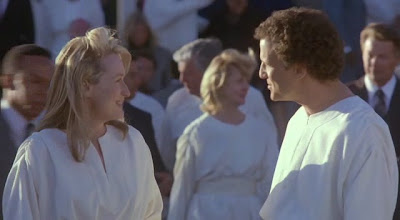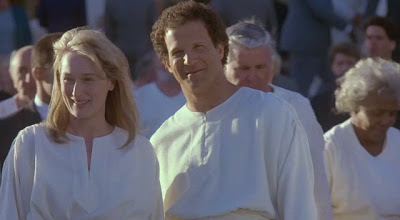Defending Your Life (1991)
Defending Your Life is one of the smartest, funniest, and original films to come out of the 1990s. Albert Brooks, playing both behind and in front of the camera, does a fantastic job of creating this "courtroom drama" set in Purgatory. By keeping a the films themes short and simple, enticing us with brilliant performances by Meryl Streep and Rip Torn, and bringing a true sense of fantasy to this picture, Brooks keeps us hooked from the opening scenes until the last. Panned by most critics, I actually found this film to be extremely witty with a Wes Anderson-esque type of dry martini humor. Brooks is easily able to transform himself into a likeable "every man" that finds himself defending his "normal" life. What works is that it feels and seems like your own life. Brooks' character isn't a superhero, he isn't a genius (only using 3% of his brain), and he isn't a playboy, he is your average human on the street. Makes decent money, celebrates being alone, just bought a new BMW, and is coasting through life rather simply. Sound like anyone you may know? Brooks creates this sen
 sation that Judgment City could exist, that the trials of your life could happen, and within all of this chaos and confusion, love could emerge.
sation that Judgment City could exist, that the trials of your life could happen, and within all of this chaos and confusion, love could emerge.
 Albert Brooks is a very smart writer. He wouldn't create your typical Hollywood love story and send it through the recycling machine. His approach to love in this film is totally random, somewhat sporadic, but yet honestly real. There is a mystery between he and Meryl Streep's relationship. That is what I loved so much about them. Typically in films of this nature you have this elaborate story of how two people meet, they fall in love, they fight, and suddenly discover that their passion is stronger than ever before (normally due to some unforeseen ... or clichéd moment), but not in this film. Brooks approaches love as if it already exists. He hints towards the notion that these two may have been in Judgment City before, that maybe they have already had their awkward courtship, that maybe the climactic cliché has already happened, and now they are just rediscovering themselves. Brooks sets this up with Streep's first lines, which are simply, "Haven't we met before?" While this may not seem like it is that exciting, the fact that they are in Judgment City after dying, and two random people recognize each other is heartwarming. I was immediately attached to these two characters from the moment they met in the Comedy Club. Their emotions didn't seem created by Hollywood, but instead created by the brilliant craftsmanship of Brooks' words. If you aren't connected to the courtroom antics of this film, than the spark that Streep creates with Brooks will surely keep you grounded for good.
Albert Brooks is a very smart writer. He wouldn't create your typical Hollywood love story and send it through the recycling machine. His approach to love in this film is totally random, somewhat sporadic, but yet honestly real. There is a mystery between he and Meryl Streep's relationship. That is what I loved so much about them. Typically in films of this nature you have this elaborate story of how two people meet, they fall in love, they fight, and suddenly discover that their passion is stronger than ever before (normally due to some unforeseen ... or clichéd moment), but not in this film. Brooks approaches love as if it already exists. He hints towards the notion that these two may have been in Judgment City before, that maybe they have already had their awkward courtship, that maybe the climactic cliché has already happened, and now they are just rediscovering themselves. Brooks sets this up with Streep's first lines, which are simply, "Haven't we met before?" While this may not seem like it is that exciting, the fact that they are in Judgment City after dying, and two random people recognize each other is heartwarming. I was immediately attached to these two characters from the moment they met in the Comedy Club. Their emotions didn't seem created by Hollywood, but instead created by the brilliant craftsmanship of Brooks' words. If you aren't connected to the courtroom antics of this film, than the spark that Streep creates with Brooks will surely keep you grounded for good.
 I would also like to applaud Brooks for his ability to create a whole new world from the inside out. Just as confused as Brooks is when he first arrives to Judgment City, we are forced to see this creative world through his eyes, and he is not afraid to demonstrate his attention to detail. The concept of food in this film kept me laughing long after the final credits rolled. The scene in the Italian restaurant with the waiter and the pies ranks among one of the funniest scenes in a film. In fact, as I type this review, I am still laughing about it. His creative mind also allowed us to consider the possibility of reincarnation and the existence of bigger and better worlds. He plants us in Judgment City, but doesn't leave us there. He allows us to travel while making us feel comfortable, thus keeping a smile on our faces throughout the entire visit. He makes us laugh, either through his own words, or through that of Rip Torn, who nearly stole every scene possible. As I continue to watch more of Rip Torn's work, I am beginning to see that he is quite a versatile actor that has very deep comedic roots. If it wasn't the instant connection between Streep and Brooks that kept this film glued together, than it definitely was the charisma of Rip Torn in the courtroom.
I would also like to applaud Brooks for his ability to create a whole new world from the inside out. Just as confused as Brooks is when he first arrives to Judgment City, we are forced to see this creative world through his eyes, and he is not afraid to demonstrate his attention to detail. The concept of food in this film kept me laughing long after the final credits rolled. The scene in the Italian restaurant with the waiter and the pies ranks among one of the funniest scenes in a film. In fact, as I type this review, I am still laughing about it. His creative mind also allowed us to consider the possibility of reincarnation and the existence of bigger and better worlds. He plants us in Judgment City, but doesn't leave us there. He allows us to travel while making us feel comfortable, thus keeping a smile on our faces throughout the entire visit. He makes us laugh, either through his own words, or through that of Rip Torn, who nearly stole every scene possible. As I continue to watch more of Rip Torn's work, I am beginning to see that he is quite a versatile actor that has very deep comedic roots. If it wasn't the instant connection between Streep and Brooks that kept this film glued together, than it definitely was the charisma of Rip Torn in the courtroom.
Finally, I would like to say that watching this film in a post-Matrix universe, there are some interesting parallels between the two. When Rip Torn is talking about allowing humans to go through to another life, or sending them back to Earth, he references the universe to a machine. Again, living in a post-Matrix world, this immediately darkened the film and perked up my ears. I know this may be grabbing at thin air, but the scene in the Matrix when Cypher is talking about how good the machine makes his steak taste, eerily reminded me of all the food used in this film. There were several other moments just like this that just seemed to fit rather snug. Whether you believe it or not, I believe the Wachowski brothers may have watched this film once or twice before creating their prized trilogy.
Overall, I thought this was an outstanding film. From the instant character excitement to the originality of the script, I thought that this was one of Brooks' best outings. The fact that you could tell that the cast was honestly having a good time in every scene, that you laughed when they laughed (which was quite a bit in this film), and that you could actually enjoy a witty comedy without guns or violence impressed me. Brooks has such a sharp humor that I cannot wait to revisit this movie to catch some of the lines that I may have missed the first time. Streep does a sensational job, while Rip Torn steals every scene he is in. Impressive to say the least, and am happy that the 90s were able to produce one original piece of comedy. By A. Gyurisin

Finally, I would like to say that watching this film in a post-Matrix universe, there are some interesting parallels between the two. When Rip Torn is talking about allowing humans to go through to another life, or sending them back to Earth, he references the universe to a machine. Again, living in a post-Matrix world, this immediately darkened the film and perked up my ears. I know this may be grabbing at thin air, but the scene in the Matrix when Cypher is talking about how good the machine makes his steak taste, eerily reminded me of all the food used in this film. There were several other moments just like this that just seemed to fit rather snug. Whether you believe it or not, I believe the Wachowski brothers may have watched this film once or twice before creating their prized trilogy.
Overall, I thought this was an outstanding film. From the instant character excitement to the originality of the script, I thought that this was one of Brooks' best outings. The fact that you could tell that the cast was honestly having a good time in every scene, that you laughed when they laughed (which was quite a bit in this film), and that you could actually enjoy a witty comedy without guns or violence impressed me. Brooks has such a sharp humor that I cannot wait to revisit this movie to catch some of the lines that I may have missed the first time. Streep does a sensational job, while Rip Torn steals every scene he is in. Impressive to say the least, and am happy that the 90s were able to produce one original piece of comedy. By A. Gyurisin

